learning resources
 [2014] Jointly developed by FAO and the College of Development Communication of the University of the Philippines Los Banos, this comprehensive sourcebook compiles a full set of guidelines, methodologies and tips for applying communication to agricultural and rural development initiatives. It aims to enable learners to design and implement locally relevant and sustainable communication strategies, combining participatory methods with appropriate communication processes and tools. The Sourcebook guides through all phases of a ComDev process:
[2014] Jointly developed by FAO and the College of Development Communication of the University of the Philippines Los Banos, this comprehensive sourcebook compiles a full set of guidelines, methodologies and tips for applying communication to agricultural and rural development initiatives. It aims to enable learners to design and implement locally relevant and sustainable communication strategies, combining participatory methods with appropriate communication processes and tools. The Sourcebook guides through all phases of a ComDev process:
Module 2. Participatory communication appraisal
Module 3. Designing the ComDev strategy and plan
Module 4. Implementing the ComDev plan
Module 5. Participatory message and materials development
Module 6. Assessing results and fostering sustainability
Module 7. Applying ComDev to rural development challenges
In addition, a Guide to ComDev Training provides practical tips for delivering effective ComDev training using the Sourcebook, including how to tailor-fit the content to stakeholders’ learning needs and practical aspects such as venue, duration, training methods or learning aids.
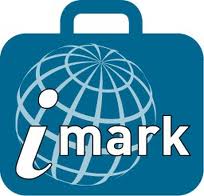 [2011] This module is part of the Information Management Resource Kit (IMARK) developed by FAO in collaboration with the Joint Donors’ Competence Development Network (Train4Dev). It is a distance learning for agricultural information management offered free of charge on the Internet or on CD-ROM.
[2011] This module is part of the Information Management Resource Kit (IMARK) developed by FAO in collaboration with the Joint Donors’ Competence Development Network (Train4Dev). It is a distance learning for agricultural information management offered free of charge on the Internet or on CD-ROM.
The module illustrates the basic concepts related to Web 2.0, social media, social networking and user generated content and describes their strategic value for an organization. It describes how social media tools can be used strategically to more effectively collaborate and exchange knowledge in the context of rural and agricultural development. Learners can consult a glossary specific to the module, a printable version of each lesson is also provided.
This module is available in English, Spanish and French.
 [2011] This learning module is part of the Information Management Resource Kit (IMARK) developed by FAO in collaboration with the Joint Donors’ Competence Development Network (Train4Dev). It is a distance learning for agricultural information management offered free of charge on the Internet or on CD-ROM.
[2011] This learning module is part of the Information Management Resource Kit (IMARK) developed by FAO in collaboration with the Joint Donors’ Competence Development Network (Train4Dev). It is a distance learning for agricultural information management offered free of charge on the Internet or on CD-ROM.The module describes how to put knowledge sharing to work, make the most of communities and networks, design and implement a strategy to identify key knowledge assets, flows and gaps into an organization. It provides methodologies and tools to support knowledge sharing and learning. Each module has a technical glossary and search function, as well as reference materials and case studies demonstrating real life applications.
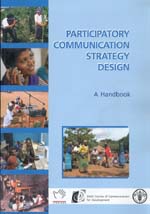 has been prepared as a training and reference guide for designing and implementing Communication for Development strategies for field projects. The Participatory Communication Strategy Design (PCSD) methodology is used to build on the results of the Participatory Rural Communication Appraisal (PRCA).
has been prepared as a training and reference guide for designing and implementing Communication for Development strategies for field projects. The Participatory Communication Strategy Design (PCSD) methodology is used to build on the results of the Participatory Rural Communication Appraisal (PRCA).The PCSD handbook outlines how to involve people in decision-making processes for effective communication planning and action. It presents a step-by-step methodology for participatory communication strategy design, and the principles for communication planning, message development, multimedia material production and the implementation of communication activities in the field.
The document is also available in Spanish.
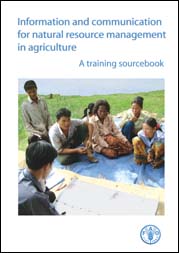 [2006] This training sourcebook is the result of a collective undertaking by the College of Development Communication of the University of Los Baños the Philippines, and FAO ComDev, in their effort to support collaborative natural resource management in agriculture in Cambodia. It is meant to be ready reference material for communication specialists and facilitators organizing training and capability building in ComDev as a strategic component of sustainable NRM and rural livelihood initiatives.
[2006] This training sourcebook is the result of a collective undertaking by the College of Development Communication of the University of Los Baños the Philippines, and FAO ComDev, in their effort to support collaborative natural resource management in agriculture in Cambodia. It is meant to be ready reference material for communication specialists and facilitators organizing training and capability building in ComDev as a strategic component of sustainable NRM and rural livelihood initiatives.The sourcebook introduces the strategic and participatory frameworks of information and communication in natural resource management in agriculture, presents the main phases of communication for development process applied to NRM (situation assessment; strategy design; materials development; management and implementation; and monitoring and evaluation) and concludes with lessons learned and recommendations from project experience in Cambodia.
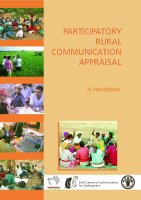 [2004] This handbook describes the procedure for planning and conducting Participatory Rural Communication Appraisal (PRCA) as the first step in the design of cost-effective and appropriate Communication for Development programs, strategies and materials at the field level.
[2004] This handbook describes the procedure for planning and conducting Participatory Rural Communication Appraisal (PRCA) as the first step in the design of cost-effective and appropriate Communication for Development programs, strategies and materials at the field level.PRCA is a participatory method for conducting communication action-research. Using a simple step-by-step methodology to conduct rural communication appraisals with communities, this handbook also provides a range of participatory tools to actively involve people in the research process to identify communication needs and to assess communication systems as a prerequisite for effective communication strategies and programmes design (see also Participatory Communication Strategy Design).
The document is available also in Spanish.
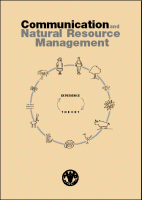 [2003] This book is a tool for people involved or interested in communication and natural resource management who seek a better understanding of how different theories and strategic change principles relate to actual practice. It relates a variety of theories and change principles in simplified, almost schematic form, to a series of real initiatives in the field through interactive "experiences".
[2003] This book is a tool for people involved or interested in communication and natural resource management who seek a better understanding of how different theories and strategic change principles relate to actual practice. It relates a variety of theories and change principles in simplified, almost schematic form, to a series of real initiatives in the field through interactive "experiences".Each "experience" is organised around a theme, a learning objective, a description of an actual natural resource management and communication initiative, and one or two theoretical lenses through which to analyse the initiative. The idea is not to "discover" the right approach but rather to create an interactive space that enables you to reflect on what might work in your own context and also on how different contexts may require different approaches, principles and theoretical frameworks.
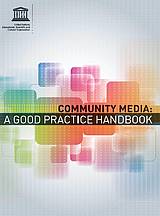 [2011] This is a collection of case studies of good practice in community media - understood as independent, civil society based media that operate for social benefit and not for profit. Community media provide with access to information and voice, facilitate community-level debate, information and knowledge sharing and input into public decision-making.
[2011] This is a collection of case studies of good practice in community media - understood as independent, civil society based media that operate for social benefit and not for profit. Community media provide with access to information and voice, facilitate community-level debate, information and knowledge sharing and input into public decision-making.The handbook looks at the enabling environment for community media to flourish (section 1), sustainability issues (section 2) and social impact (section 3). 30 examples on radio, television, Internet and mobile, are drawn from a broad range of geopolitical contexts – different regions, cultures, languages and political systems – including urban and rural areas, small and large countries. Each case study summarizes the good practice, highlights some of the key characteristics and provides references and links.
 [2008] This sourcebook makes the case about the importance of incorporating communication from the onset of development policies and practices, as a necessary ingredient to enhance sustainability and avoid the failures of the past. It intends to offer a broader conception of communication, including other purposes and functions than the usual ones.
[2008] This sourcebook makes the case about the importance of incorporating communication from the onset of development policies and practices, as a necessary ingredient to enhance sustainability and avoid the failures of the past. It intends to offer a broader conception of communication, including other purposes and functions than the usual ones.Communication for Development goes beyond raising awareness, informing, persuading, or changing behavior. It is also about listening, exploring, understanding, empowering, and building consensus for change. Two-way communication should be used in any sector of intervention to understand, assess, explore, and facilitate decision making related to change. Combined with the effective use of one-way communication approaches, two-way communication has proved to significantly enhance results and the sustainability of development initiatives.
 [2011] The FAO-Dimitra is a participatory information and communication project which contributes to improving the visibility of rural populations, women in particular. Communicating Gender for Rural Development presents the project experience in using communication for development to enable the most marginalised groups, including women, to take ownership of their development and achieve economic and social empowerment. Capacities for harnessing the full power of this approach are fairly limited and there have been relatively few studies of the subject.
[2011] The FAO-Dimitra is a participatory information and communication project which contributes to improving the visibility of rural populations, women in particular. Communicating Gender for Rural Development presents the project experience in using communication for development to enable the most marginalised groups, including women, to take ownership of their development and achieve economic and social empowerment. Capacities for harnessing the full power of this approach are fairly limited and there have been relatively few studies of the subject.The publication encourages the inclusion of a gender perspective in communication for development initiatives in rural areas. It suggests practical ways of going about this, aiming to change attitudes and working practices so that development projects and programmes take greater account of the specificities, needs and aspirations of men and women.
The document is also available in French.




